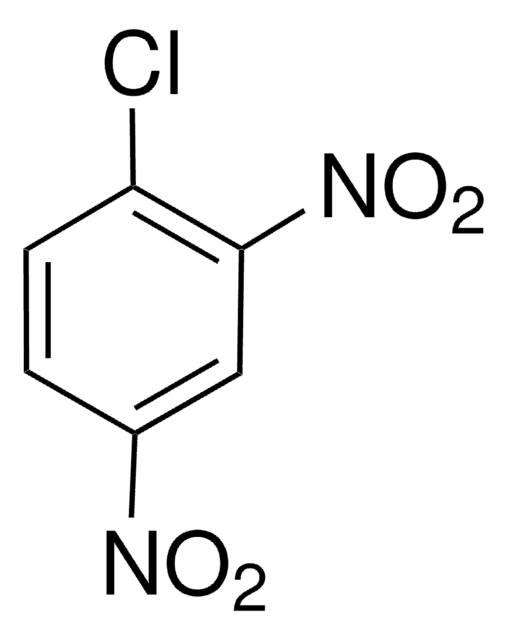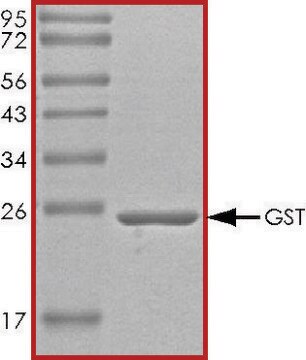Wszystkie zdjęcia(1)
Key Documents
GS70
GST P1-1, Recombinant Human
Synonim(y):
DFN7, FAEES3, GST3, GSTP, HEL-S-22, glutathione S-transferase pi
Zaloguj sięWyświetlanie cen organizacyjnych i kontraktowych
About This Item
Kod UNSPSC:
12352200
NACRES:
NA.26
Polecane produkty
pochodzenie biologiczne
human
Poziom jakości
rekombinowane
expressed in E. coli
Próba
>95% (SDS-PAGE)
Postać
frozen liquid
aktywność właściwa
60.45 units/mg protein
masa cząsteczkowa
23 kDa
temp. przechowywania
−70°C
informacje o genach
human ... GSTP1(2950)
Opis ogólny
using spectrophotometric determination of 1-chloro-2,4-dinitrobenzene (CDNB) conjugation with reduced glutathione (1.0 mM) in 100 mM KPO4 (pH 6.5) at room temperature.
Działania biochem./fizjol.
Glutathione S-transferase pi 1 (GSTP1) is an enzyme that in humans is encoded by the GSTP1 gene. Glutathione S-transferases (GSTs) are a family of enzymes that play an important role in detoxification by catalyzing the conjugation of many hydrophobic and electrophilic compounds with reduced glutathione. Based on their biochemical, immunologic, and structural properties, cytosolic and membrane-bound forms of glutathione S-transferase are encoded by two distinct supergene families. At present, eight distinct classes of the soluble cytoplasmic mammalian glutathione S-transferases have been identified: alpha, kappa, mu, omega, pi, sigma, theta and zeta. The GSTs are thought to function in xenobiotic metabolism and play a role in susceptibility to cancer, and other diseases.
This GST family member is a polymorphic gene encoding active, functionally different GSTP1 variant proteins that are thought to function in xenobiotic metabolism and play a role in susceptibility to cancer, and other diseases.
Przechowywanie i stabilność
The enzyme should be used by the end-user customer within 1 year of receipt.
This page may contain text that has been machine translated.
Kod klasy składowania
10 - Combustible liquids
Klasa zagrożenia wodnego (WGK)
WGK 1
Temperatura zapłonu (°F)
Not applicable
Temperatura zapłonu (°C)
Not applicable
Certyfikaty analizy (CoA)
Poszukaj Certyfikaty analizy (CoA), wpisując numer partii/serii produktów. Numery serii i partii można znaleźć na etykiecie produktu po słowach „seria” lub „partia”.
Masz już ten produkt?
Dokumenty związane z niedawno zakupionymi produktami zostały zamieszczone w Bibliotece dokumentów.
Klienci oglądali również te produkty
J Haluskova et al.
Bratislavske lekarske listy, 116(2), 79-82 (2015-02-11)
Prostate cancer (PCa) represents one of the most complicated human tumors and, like many others malignancies, arises from progressive genetic and epigenetic alterations. Among all recognized epigenetic alterations, aberrant DNA methylation (hypo- and hypermethylation) is the most important and the
Mohamad Nidal Khabaz et al.
Asian Pacific journal of cancer prevention : APJCP, 16(5), 1707-1713 (2015-03-17)
Eighty six cases of invasive ductal breast carcinomas were utilized to investigate GSTP1 polymorphisms in certain immunohistochemistry (IHC) subtypes of breast cancer with respect to ER, PR and HER2 expression. The frequency of wild allele homozygote, heterozygote and variant allele
Q F Li et al.
Genetics and molecular research : GMR, 14(2), 6762-6772 (2015-07-01)
Epigenetic silencing of the GSTP1 gene by promoter methylation has been associated with increased risk and shortened survival in patients with hepatocellular carcinoma (HCC). We therefore conducted a meta-analysis to obtain a more precise estimate of this association. By searching
Cheng-Fan Zhou et al.
Archives of dermatological research, 307(6), 505-513 (2015-06-06)
Numerous epidemiological studies have evaluated the association of Glutathione S-transferase P1 (GSTP1) Ile105Val polymorphism with the risk of skin cancer. However, the results remain inconclusive. To derive a more precise estimation of the association between the GSTP1 Ile105Val polymorphism and
Junhua Wu et al.
PloS one, 10(6), e0128280-e0128280 (2015-06-06)
Brick tea type fluorosis is a public health concern in the north-west area of China. The association between SNPs of genes influencing bone mass and fluorosis has attracted attention, but the association of SNPs with the risk of brick-tea type
Nasz zespół naukowców ma doświadczenie we wszystkich obszarach badań, w tym w naukach przyrodniczych, materiałoznawstwie, syntezie chemicznej, chromatografii, analityce i wielu innych dziedzinach.
Skontaktuj się z zespołem ds. pomocy technicznej








